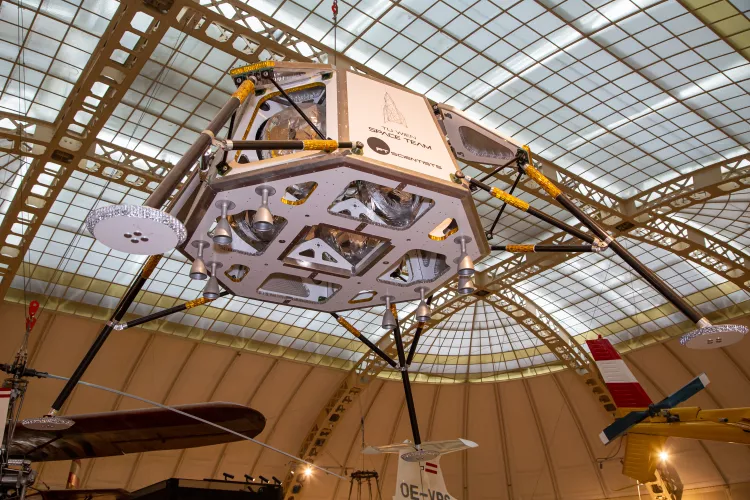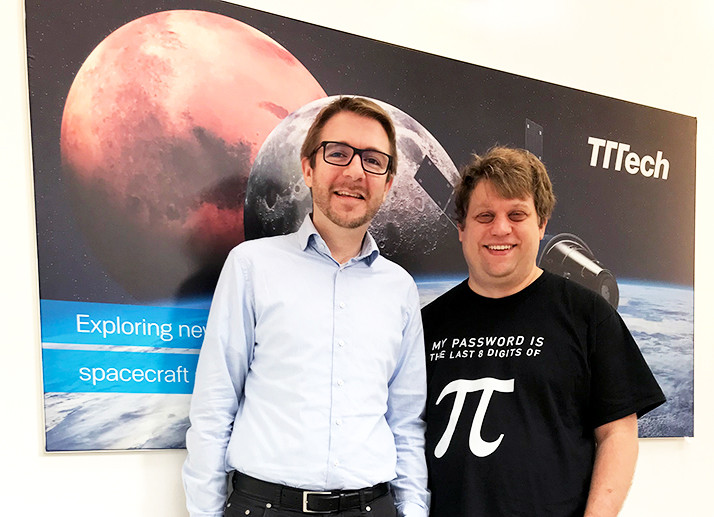
The Austrian space sector is characterized by high export rates and contributes to large international projects tendered by Europe’s national space agencies, the European Space Agency ESA, and NASA. Innovative Austrian companies provide key components and technology for, among others, NASA Artemis which will bring humans back to the Moon and further to Mars, the new European launcher Ariane 6, the EU’s earth observation program Galileo, or Europe’s Global Navigation Satellite System Copernicus. TTTech is proud to be one of them with safe networked computing platforms that are on board of NASA’s Orion spacecraft and the European Service Module as well as NASA’s Gateway.
TTTech was founded in 1998 as a spin-off of Vienna’s Technical University and is active in a variety of markets, among them space and aviation. Supporting the TU Wien Space Team based at the Technical University of Vienna, is part of TTTech’s ongoing collaboration with and strong ties to local and international educational facilities and the research community.
The TU Wien Space Team is an interdisciplinary team of students who carry out research together, participate in competitions, and work closely with the space industry. Students from all universities are welcome, the only requirement is an interest in space and technology. In the beginning, the TU Wien Space Team had only a few members, today there are almost 200 that work on the many projects running in parallel. The proportion of women is also significantly higher today than in the early years.
Several TU Wien Space Team alumni are now TTTech employees. We met with two of them to talk about their experiences during their studies, at the TU Wien Space Team, and at TTTech.
The TU Wien Space Team: how it all began
Thomas Bittner was one of the founding members of the TU Wien Space Team 12 years ago and later held the Secretary position. He studied Physics at the Vienna University of Technology and Embedded Systems at the FH Technikum Vienna and is now developing software for space projects at TTTech: "One of my colleagues was on an exchange program in France and learned about the work of the local space team, which was supported by the CNES (French Space Agency). The experience sparked his interest and after his return, he proposed a space team at TU. I was one of the first to participate. Initially, we were a small group of five to ten people and entered an annual rocket competition for students in France. We developed and built rockets for this competition and also established the first contacts with sponsors."
Christian Plasounig is a Systems Engineer at TTTech. He joined the TU Wien Space Team in 2012 while studying Physics, and spent seven years working on the projects team, in project management, and a few years as Director. He still remembers the early days of the TU Wien Space Team: "At first, we had just one big project each year, but after working with the FH Wiener Neustadt on a CubeSat (note: small, cube-shaped satellite) and its launch brought us a lot of publicity. The next step was a project in the USA, where we tried to set a new altitude record with a homemade two-stage rocket. It was an exciting and ambitious project, where coordination and teamwork were particularly important – and of course, we also had to overcome many challenges in order to get authorization for transporting the rocket to the USA, getting it through customs, and receiving a launch permit."
With these new projects, trials, and ideas, the TU Wien Space Team slowly began to grow. Internal events at the Technical University and celebrations were just as important as visiting trade fairs in Austria and abroad, says Thomas Bittner: "We actively started to look for sponsors for our projects and to approach companies. In the beginning, we mainly obtained donations in kind, such as materials for building the rockets or the opportunity to use machines in the factories of sponsors in making our components."
Intensive work on space topics, setbacks, and successes
Our first sponsors provided us with tools, equipment, and transport opportunities," remembers Christian Plasounig, "The media attention in Austria also helped us to find sponsors locally, but mostly it was hard work and directly approaching companies at trade fairs such as the ILA Berlin Air Show - that's also how we were able to work with Airbus to create components. Another highlight was that one of our projects, a mock-up for a moon landing module, was exhibited at the Technical Museum in Vienna."
But setbacks also had to be borne, says Thomas Bittner: "Of course, we didn’t only have successes - when one of our rockets crashed or a test didn’t work out, it was a heavy blow to us. You invest a lot in these projects and the TU Wien Space Team was a very time-consuming hobby. We often worked through the night, especially before competitions, which was a challenge when you consider our study schedules. But you learn to deal with pressure, with deadlines and little sleep, and ultimately you get to know your personal limits and how to work together as a team. This is a very intensive experience – for the first competitions in France, we were seven people in one car, driving for 24 hours and 2,000 km – so you get to know each other very well as a team. But even though it wasn't always easy, it was a great time for me!"
Christian Plasounig has also learned a lot from his studies: "During my time with the TU Wien Space Team, I learned to work on projects. There's a lot more to a competition than just getting a rocket to fly - we also had to develop it and try out a lot of new things, do a lot of testing as well as test flights at different altitudes. Recyclability was a big issue, because after the tests the rocket had to come back in one piece with a parachute, so we could improve it further. At work, I particularly benefited from working in a team and in an interdisciplinary manner. I also learned how to deal with stress and work toward a deadline under time pressure. Especially as a project manager for the TU Wien Space Team – when you need to develop electronics, mechanics and software and then seamlessly put everything together at the end. It’s actually quite similar to what I do today."
From the Technical University to the (space) industry
Thomas Bittner and Christian Plasounig were interested in space, space travel, and astronomy at an early stage, and above all in the functioning and interaction of components. During their time with the TU Wien Space Team, they learned a lot for their future careers - and they are also happy to give tips to students who are interested in working in this industry.
Christian Plasounig: "For me it was important to gain hands-on experience, not just to learn theory from books, but to build something myself, to think about how something can work. This gives a much better technical insight and understanding of problems. I took advantage of all available opportunities - the labs at university and the projects with the TU Wien Space Team, but I also implemented several software and electronics projects in my private time. When applying to a company, there is usually a question about a project that you have completed that the person facing you will use to evaluate problem-solving capabilities. But I was also able to establish good contacts in the industry through the TU Wien Space Team and then came to work for one of our sponsors through an internship and part-time work. I then came to TTTech via a recommendation from Thomas."
Thomas Bittner: “It was the same for me – in my private life I occupied myself with controllers and embedded systems. When you start in a company, it is immediately obvious that you are familiar with this, even if it’s not from work experience but 'only' as a private hobby. Having the TU Wien Space Team in my CV was a bonus for me! It had a massive impact on my career path – I met a lot of people there and through these contacts I found a job right after finishing my studies. I came to TTTech thanks to a colleague from my first company."
Austrian communication technology for international space programs like NASA Artemis
At TTTech, Thomas Bittner and Christian Plasounig are working together again, this time on the products and solutions for the NASA Artemis program, what has the goal of bringing the first woman and the first person of color to the Moon and to further exploration of space to Mars.

Thomas Bittner: "It is incredibly exciting - we are working on the communication systems for the Gateway, the new space station in lunar orbit, which will go into operation in the next few years, and the astronauts there rely on our solutions. I like solving problems and developing a good product, even if it involves a lot of documentation – we have to prove that everything has been tested and will work for many years. The reliability standards in the space industry are very high because systems have to function without a hitch for more than 15 years; after all, there are few if any maintenance options. Accurate documentation is also something we already learned about at the TU Wien Space Team. There are very precise specifications and criteria that our rocket had to meet in order to be approved for a competition."
Christian Plasounig: "Yes, exactly, documentation is incredibly important for projects in a security-critical context – the coding itself is perhaps 10% of the work, while 90% is documentation effort. I work in systems engineering for our Gateway projects. I’m in constant contact with our software and chip departments, and also with our partners such as Beyond Gravity. I’m also the technical contact person for our customer Northrop Grumman in the USA, who builds the Gateway’s habitation and logistics module. It is one of the first two modules that will be sent to space and together with Beyond Gravity we are supplying networking equipment (network interface cards, switches, and onboard computers) in practical 'boxes'. The customer can install these boxes in the space station similar to a PC."
As early as next year, a crew will be flying around the Moon for the first time in the NASA Orion spacecraft, and the next moon landing and the first stay at the Gateway space station will follow soon thereafter. In all of these, technology from Austria will be playing an important role.